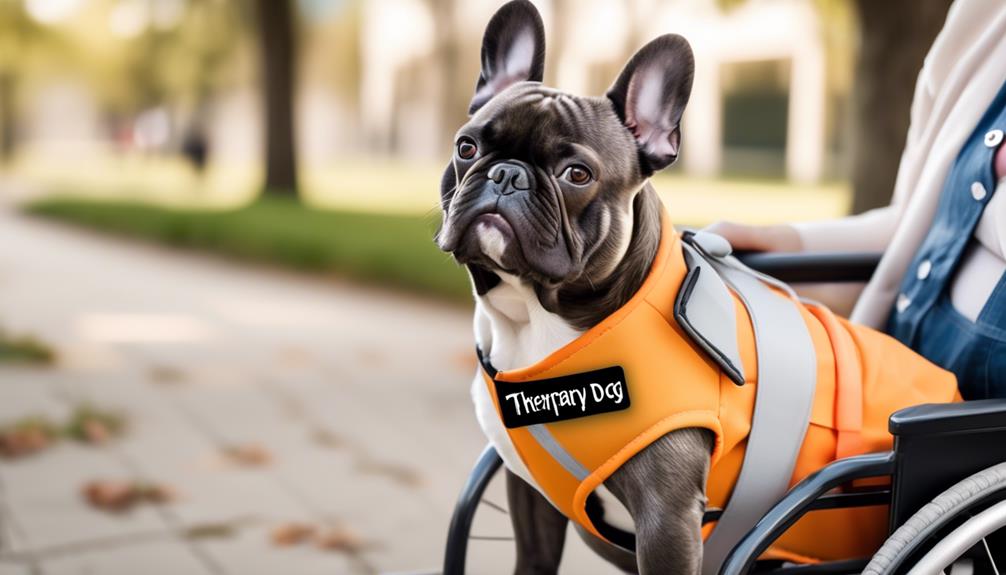The Ultimate Guide to Training a French Bulldog Therapy Dog
You know the feeling when you meet someone who just seems to connect with everyone, who can brighten a room with their presence? It's like they have a natural gift for making others feel at ease.
Now, imagine if your French Bulldog could bring that same kind of comfort and joy to people in need. The process of training a French Bulldog to become a therapy dog is not only rewarding for the dog but also incredibly impactful for the individuals they will serve.
But where do you begin? How do you mold your lovable Frenchie into a reliable and empathetic therapy dog? Let's explore the essential steps and considerations in this ultimate guide, so you can unlock the full potential of your French Bulldog and make a meaningful difference in the world.
French Bulldog Therapy Dog Requirements

To become a therapy dog, a French Bulldog must undergo specific training and meet certain behavioral and socialization requirements. French Bulldogs are known for their affectionate and easygoing nature, making them well-suited for therapy work. Their temperament, characterized by being adaptable, patient, and friendly, makes them excellent candidates for becoming therapy dogs. However, it's essential to ensure that they receive proper training to meet the specific needs of therapy work.
French Bulldog training for therapy work should focus on obedience, socialization, and desensitization to various environments and stimuli. Training should also include exposure to different people, including children, the elderly, and individuals with disabilities. This helps in shaping their behavior and responses, preparing them for the diverse situations they may encounter as therapy dogs. Additionally, therapy dog certification programs often require French Bulldogs to demonstrate good manners, calmness, and a gentle demeanor. It's important to enroll them in a reputable certification program that evaluates and assesses their suitability for therapy work.
Therapy dog temperament goes beyond the typical French Bulldog temperament, as it encompasses the ability to remain calm, comforting, and responsive in various settings. Therefore, while French Bulldogs may naturally possess many qualities required of therapy dogs, specific training and certification are crucial to ensure they meet the standards and expectations for therapy work.
With the right training and certification, French Bulldogs can make a positive impact as therapy dogs, providing comfort and support to those in need.
Choosing the Right Training Program
Considering the specific requirements for therapy dog training, it's essential to choose a program that focuses on developing your French Bulldog's obedience, socialization, and adaptability to various environments.
When selecting a training program for your French Bulldog, keep in mind the following key factors:
- Positive Reinforcement: Look for a training program that emphasizes positive reinforcement techniques. These methods focus on rewarding good behavior rather than punishing undesirable actions, creating a positive and enjoyable learning experience for your French Bulldog.
- Professional Guidance: Seek out a training program that offers professional guidance from experienced trainers. Professional trainers can provide valuable insights, personalized advice, and effective strategies to address your French Bulldog's specific training needs.
- Socialization Opportunities: Choose a training program that provides ample opportunities for your French Bulldog to socialize with other dogs and people. Socialization is crucial for therapy dogs, as they need to feel comfortable and at ease in various social settings.
- Adaptability Training: Opt for a program that includes training exercises focused on helping your French Bulldog adapt to different environments and situations. This can include exposure to various sounds, sights, and locations to ensure your dog remains calm and composed during therapy visits.
Essential Obedience Training
When starting essential obedience training for your French Bulldog therapy dog, focus on building a strong foundation of basic commands and behaviors. Positive reinforcement is key in this process. Use treats, praise, and affection to encourage good behavior and prompt responses to commands. Consistency and patience are crucial during this phase. Set aside dedicated time each day to work on obedience training, and be patient as your French Bulldog learns and progresses.
Start with simple commands like 'sit,' 'stay,' 'come,' and 'down.' Use a calm yet firm voice, and always follow through with praise or a treat when your dog responds correctly. Repeat these commands consistently in various environments to help your French Bulldog generalize the training. As they become more proficient, gradually introduce more complex commands and behaviors.
It's important to remember that every dog learns at their own pace, so be patient and understanding throughout the training process. If your French Bulldog struggles with a particular command, take a step back and work on reinforcing the basics before moving forward. Consistency in your training approach will help your dog understand what's expected of them.
Socialization and Exposure to Different Environments
As your French Bulldog becomes proficient in essential obedience commands, it's crucial to gradually expose them to different environments and socialize them effectively. This step is essential for developing a well-rounded therapy dog. Here's how you can ensure your Frenchie is well-socialized and comfortable in various settings:
- Puppy Socialization: Introduce your French Bulldog to other puppies and friendly adult dogs in a safe and controlled environment. This will help them learn appropriate social behaviors and build confidence around other animals.
- Public Exposure: Take your Frenchie to different public places such as parks, pet-friendly stores, and busy streets. Exposing them to diverse settings will help them become comfortable in environments they may encounter during therapy work.
- Environmental Desensitization: Gradually expose your dog to various stimuli such as loud noises, different floor surfaces, and unfamiliar objects. This will help prevent fear or anxiety reactions in new environments.
- New Experiences: Introduce your French Bulldog to new experiences such as car rides, elevators, and automatic sliding doors. This will broaden their experiences and help them adapt to different situations they may encounter during therapy visits.
Consistent exposure to different environments and positive socialization experiences will help your French Bulldog become a confident and well-adjusted therapy dog, capable of providing comfort to those in need.
Introducing Therapy Dog Specific Skills
To prepare your French Bulldog for therapy work, it's time to introduce specific skills that will enhance their ability to provide comfort and support to those in need. Canine communication and behavioral cues are essential for a therapy dog. Start by teaching your French Bulldog to understand and respond to human emotions. Introduce them to various emotional states and teach them how to provide appropriate responses, such as nuzzling, leaning, or offering a paw. This will enable your dog to offer emotional support and comfort techniques effectively.
Additionally, focus on teaching your French Bulldog to remain calm and composed in various situations. This includes exposure to loud noises, sudden movements, and crowded spaces. Use positive reinforcement to encourage your dog to remain attentive and composed amidst distractions. Incorporate obedience training into their routine, emphasizing commands like 'sit,' 'stay,' and 'leave it,' which are valuable for maintaining control in unpredictable environments.
Furthermore, work on refining your dog's ability to interact gently and respectfully with people of all ages and physical conditions. Teach them to approach individuals calmly and to be mindful of personal space. Therapy dogs must exhibit patience and gentleness, especially when engaging with individuals who may be fragile or vulnerable.
Preparing for Certification and Evaluations
Prepare your French Bulldog for certification and evaluations by consistently practicing the specific therapy dog skills they'll be assessed on. This will ensure that your dog is well-prepared and confident in their abilities when it comes time for their evaluation.
Here are some key areas to focus on during your preparation:
- Handling distractions: Introduce your French Bulldog to various distractions they might encounter during therapy visits, such as loud noises, unfamiliar scents, or sudden movements. Practice obedience and focus exercises in different environments to help your dog remain calm and focused in distracting situations.
- Handling medical situations: Familiarize your French Bulldog with common medical equipment they may encounter during therapy work, such as wheelchairs, crutches, or hospital beds. Practice gentle and cautious interactions with individuals who may have mobility challenges or medical needs, ensuring that your dog remains calm and composed in these situations.
- Mock evaluations: Simulate the certification and evaluation process as closely as possible to help your French Bulldog acclimate to the testing environment and expectations. Practice walking through the evaluation criteria and performing the required tasks to build confidence and familiarity.
- Public interactions: Provide opportunities for your French Bulldog to interact with a variety of people in public settings, helping them become comfortable and well-socialized in different environments. This will prepare them for the diverse interactions they'll experience during therapy visits.
Understanding Legal and Ethical Considerations

When preparing your French Bulldog for certification and evaluations, it's essential to understand the legal and ethical considerations that come with engaging in therapy work. As a therapy dog handler, you have legal obligations to ensure the safety and well-being of both your dog and the individuals you'll be working with. This includes understanding and complying with local, state, and federal laws pertaining to therapy animal work. It's crucial to familiarize yourself with laws related to animal welfare, public access rights, and liability protection. For instance, you may need to adhere to leash laws, vaccination requirements, and animal welfare regulations.
In addition to legal obligations, you also have ethical responsibilities as a therapy dog handler. This involves upholding the highest standards of professionalism and ethical conduct while participating in therapy dog activities. You must prioritize the welfare of the individuals you're working with, respect their autonomy and privacy, and maintain their dignity at all times. It's important to recognize and respect cultural, social, and individual differences, ensuring that your therapy dog interactions are inclusive and respectful of diverse backgrounds.
Furthermore, as a therapy dog handler, you should prioritize honesty and transparency in representing your dog's abilities and training. This includes accurately portraying your dog's temperament, behavior, and training achievements to organizations, facilities, and individuals seeking therapy dog services. Upholding legal obligations and ethical responsibilities not only ensures the safety and well-being of everyone involved but also contributes to the credibility and success of therapy dog programs.
Maintaining Your French Bulldog's Well-being
Ensure your French Bulldog's well-being by incorporating regular exercise and a balanced diet into their daily routine. Maintaining your French Bulldog's well-being is crucial for their overall health and happiness. Here are some essential aspects to consider:
- Grooming Needs: Regular grooming is vital for your French Bulldog's well-being. Brush their coat at least once a week to minimize shedding and keep their skin healthy. Additionally, trim their nails regularly to prevent discomfort and potential injuries.
- Mental Stimulation: Engage your French Bulldog in mental exercises to keep their mind sharp and active. Provide interactive toys and puzzle games to stimulate their cognitive abilities and prevent boredom.
- Exercise Requirements: French Bulldogs require regular exercise to stay fit and maintain a healthy weight. Aim for at least 30 minutes of physical activity each day, such as brisk walks or interactive play sessions.
- Emotional Health: Pay attention to your French Bulldog's emotional well-being. Spend quality time together, offer positive reinforcement, and create a secure and nurturing environment to foster their emotional health.
Frequently Asked Questions
Can a French Bulldog With Health Issues Be Trained as a Therapy Dog?
Yes, a French Bulldog with health issues can be trained as a therapy dog. Consider health considerations when choosing training methods. Bonding and support systems are essential for both you and your dog throughout the training process.
How Can I Find Therapy Dog Opportunities for My French Bulldog in My Local Area?
To find local volunteer opportunities for your French Bulldog therapy dog, start by researching therapy dog certification programs in your area. Reach out to local hospitals, nursing homes, and schools to inquire about their therapy dog programs and how your dog can get involved.
What Are Some Common Challenges Specific to Training a French Bulldog as a Therapy Dog?
Training a French Bulldog as a therapy dog comes with common challenges. Consistent training techniques, thorough socialization, and effective behavior management are crucial. Additionally, navigating the therapy dog certification process can be demanding but rewarding.
Are There Any Specific Grooming or Hygiene Requirements for Therapy Dogs, Especially for French Bulldogs?
When grooming a French Bulldog therapy dog, it's important to maintain their coat, trim nails, and clean ears regularly. Hygiene standards are crucial, such as bathing as needed, brushing teeth, and keeping up with flea and tick prevention.
How Can I Help My French Bulldog Maintain a Calm and Focused Demeanor During Therapy Dog Visits?
To help your French Bulldog maintain a calm and focused demeanor during therapy dog visits, try relaxation techniques like deep breathing or gentle massage. You can also use distraction methods such as interactive toys or training exercises.
Conclusion
You've learned the key steps to training your French Bulldog to become a therapy dog.
With the right training program, essential obedience skills, socialization, and specific therapy dog training, you're well on your way to certification.
Remember to consider legal and ethical considerations, and always prioritize your French Bulldog's well-being.
With dedication and consistency, you and your furry friend can make a positive impact as a therapy dog team.
Good luck on your training journey!
